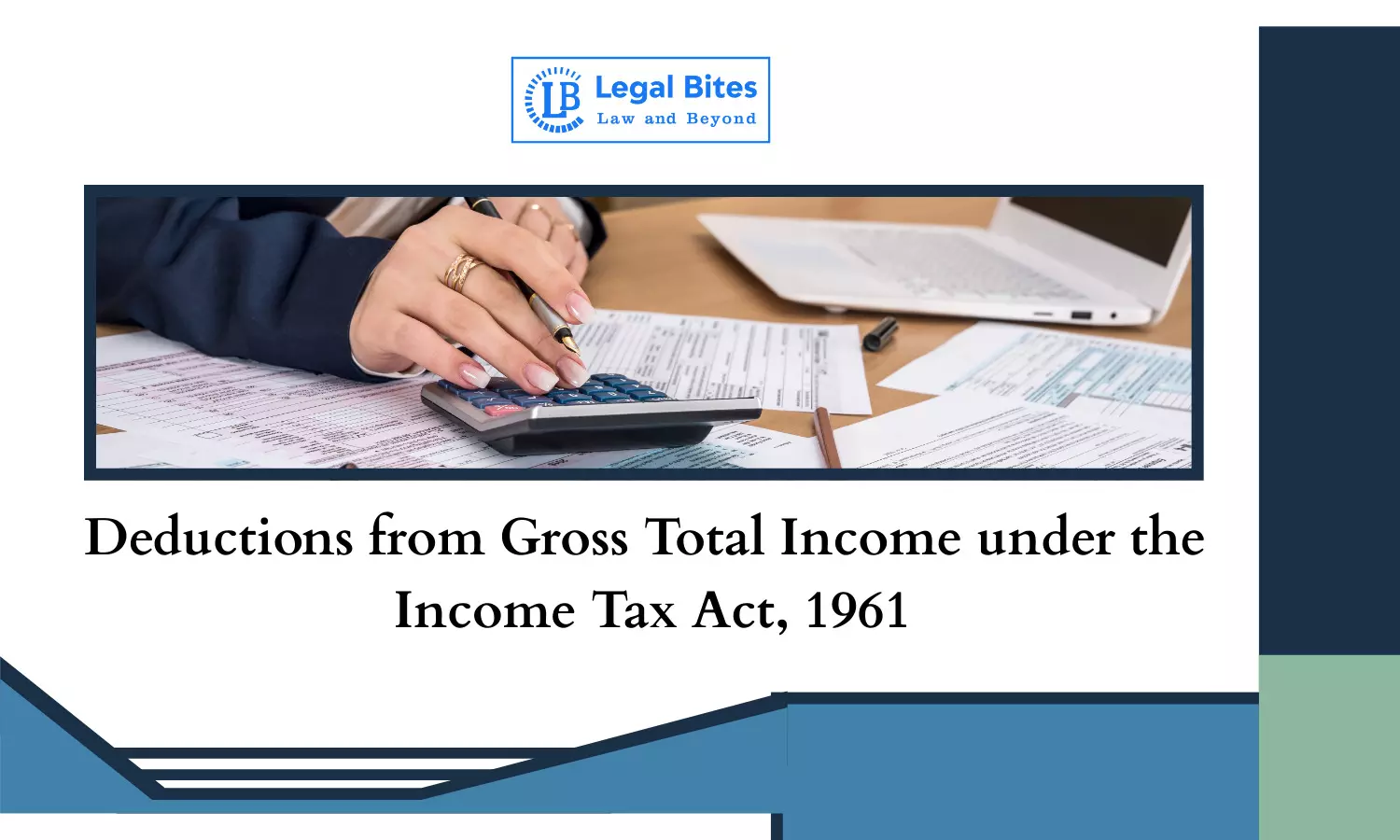Deductions from Gross Total Income under the Income Tax Act, 1961
This article explores the key deductions from gross total income, eligibility criteria, and the legal provisions associated with them.

The Income Tax Act, 1961 provides several deductions from gross total income (GTI) that help reduce the taxable income of an assessee, thereby minimizing their tax liability. These deductions are an essential component of tax planning, encouraging individuals to invest in specified instruments and support social objectives like education, health, retirement savings, and housing. Deductions are available under Chapter VI-A, specifically from Sections 80C to 80U.What is Gross Total...
The Income Tax Act, 1961 provides several deductions from gross total income (GTI) that help reduce the taxable income of an assessee, thereby minimizing their tax liability. These deductions are an essential component of tax planning, encouraging individuals to invest in specified instruments and support social objectives like education, health, retirement savings, and housing. Deductions are available under Chapter VI-A, specifically from Sections 80C to 80U.
What is Gross Total Income?
Before understanding deductions, it's important to grasp what constitutes gross total income. Gross Total Income is the sum of income under all five heads:
- Income from Salaries
- Income from House Property
- Profits and Gains of Business or Profession
- Capital Gains
- Income from Other Sources
Gross Total Income = Total Income before Deductions under Chapter VI-A
Once GTI is computed, deductions under Chapter VI-A can be claimed to arrive at the Total Taxable Income.
Overview of Chapter VI-A Deductions
The deductions are broadly classified as:
- Deductions for certain payments (Sections 80C to 80GGC)
- Deductions in respect of certain incomes (Sections 80HH to 80RRB)
- Other deductions like those for disabled individuals (Sections 80U, 80DD, etc.)
These deductions can only be claimed by individuals or Hindu Undivided Families (HUFs), with some available to firms or companies.
Key Deductions from Gross Total Income
1. Section 80C – Deduction for Investments
Eligibility: Individuals and HUFs
Maximum Limit: ₹1,50,000
- Investments and payments qualifying for deduction:
- Life Insurance Premium (for self, spouse, children)
- Employee Provident Fund (EPF)
- Public Provident Fund (PPF)
- National Savings Certificate (NSC)
- Sukanya Samriddhi Account
- Tuition fees (for maximum 2 children)
- Principal repayment of housing loan
- Five-year fixed deposit with banks
- Equity-linked savings scheme (ELSS)
Note: Section 80C is one of the most claimed deductions and encourages long-term savings and investment.
Deduction for Deposits in National Savings Scheme or Deferred Annuity Plans (Section 80CCA)
Section 80CCA provides a deduction for individuals, HUFs, and certain AOPs for:
- Deposits made under notified schemes like the National Savings Scheme, or
- Payments towards LIC's notified deferred annuity plans,
- Out of income chargeable to tax, up to a limit of ₹40,000.
However, if the amount (including interest or bonus) is later withdrawn or received as annuity/bonus, it will be taxable in the year of receipt.
If the HUF is partitioned or an AOP is dissolved, the person receiving the amount will be liable to pay tax under the same rule.
Interest on such deposits is taxable only upon withdrawal, not annually.
2. Section 80CCC – Pension Funds
Eligibility: Individuals
Limit: Part of ₹1.5 lakh under Section 80C
Amount deposited in annuity plans of LIC or other approved insurers for receiving pension qualifies for deduction.
3. Section 80CCD – Contributions to NPS
- 80CCD(1): Employee or individual’s contribution (up to 10% of salary or 20% of gross total income for self-employed)
- 80CCD(1B): Additional deduction of ₹50,000 (over and above ₹1.5 lakh limit)
- 80CCD(2): Employer’s contribution to NPS (up to 10% of salary – not included in the ₹1.5 lakh cap)
This section provides an extra benefit of ₹50,000 under 80CCD(1B) to encourage retirement savings through the National Pension Scheme (NPS).
4. Section 80D – Medical Insurance Premium
Eligibility: Individuals and HUFs
Deduction Limit:
- ₹25,000 for self, spouse, and dependent children
- Additional ₹25,000 for parents (₹50,000 if senior citizens)
- ₹5,000 for preventive health check-up (within above limits)
Medical expenditure incurred on senior citizens (if no insurance) is also deductible under this section.
5. Section 80DD – Maintenance of Disabled Dependent
Eligibility: Resident Individuals/HUFs
Deduction Limit:
- ₹75,000 (for 40% to 80% disability)
- ₹1,25,000 (for severe disability above 80%)
Conditions include expenditure on medical treatment, nursing, and maintenance of a disabled dependent or payment to specified insurance plans for their benefit.
6. Section 80DDB – Medical Treatment of Specified Diseases
Eligibility: Resident Individuals and HUFs
Deduction:
- Up to ₹40,000 (₹1,00,000 for senior citizens) for treatment of specified diseases like cancer, chronic renal failure, etc.
A prescription from a specialist doctor is mandatory for claiming this deduction.
7. Section 80E – Interest on Education Loan
Eligibility: Individuals
Deduction: Full interest paid on education loan (no upper limit)
The loan must be taken for higher education of self, spouse, children or a student for whom the taxpayer is a legal guardian. Deduction allowed for 8 years from the year repayment starts.
8. Section 80EE/80EEA – Interest on Home Loan
- 80EE: For loans sanctioned between 2016–17; deduction up to ₹50,000
- 80EEA: For loans between FY 2019–20 and FY 2021–22; deduction up to ₹1,50,000
These are in addition to Section 24(b) deduction (interest on home loan under House Property head).
9. Section 80G – Donations to Charitable Institutions
Eligibility: All assesses
Deduction: 50% or 100% of donation with or without restriction (qualifying limit of 10% of GTI in some cases)
Donations must be made to specified funds, like:
- Prime Minister’s National Relief Fund
- National Defence Fund
- Approved NGOs and charitable institutions
Donations in cash above ₹2,000 are not eligible for deduction.
10. Section 80GG – Rent Paid (no HRA received)
Eligibility: Individuals not receiving HRA
Deduction Limit: Least of the following:
- ₹5,000 per month
- 25% of total income
- Rent paid – 10% of total income
The taxpayer must not own any residential property at the place of residence or employment.
11. Section 80TTA/80TTB – Interest on Savings
- 80TTA (Individuals & HUFs): Deduction up to ₹10,000 on savings account interest (excluding FD interest)
- 80TTB (Senior Citizens): Deduction up to ₹50,000 on interest from savings and fixed deposits
12. Section 80U – Deduction for Disabled Individuals
Eligibility: Resident Individuals
Deduction:
- ₹75,000 (disability 40% to 80%)
- ₹1,25,000 (severe disability above 80%)
Unlike 80DD, this section is for self-disability. Certificate of disability from a government doctor is required.
Important Case
Murugappa and Sons v. Commissioner of Income-Tax [1989] 178 ITR 410 (Mad)
In Murugappa and Sons v. Commissioner of Income-Tax (1989), the Madras High Court held that no deductions under Sections 80K and 80T of the Income Tax Act, 1961, can be allowed if the gross total income of the assessee is a negative figure (i.e., a loss).
The Court emphasised that as per Sections 80A(2) and 80B(5), deductions under Chapter VI-A are permissible only if the gross total income is a positive figure.
Since the assessee-firm had a net loss after adjusting business losses against other income, the Court affirmed the Tribunal’s decision denying the deductions and ruled in favour of the Revenue.
Important Considerations for Claiming Deductions
Proof and Documentation: Proper records, receipts, and certificates must be retained and produced when demanded.
Filing of Return: Some deductions (e.g., 80GG, 80EE) require specific declaration in the ITR.
Income Tax Deductions FY 2025-26: Budget 2025 Updates
Under the new tax regime, the employer’s contribution to the National Pension System (NPS)—up to 14% of the basic salary for central government employees (10% for others)—is eligible for deduction under Section 80CCD(2), helping reduce taxable income without any monetary ceiling.
Finance Act 2025: Amendments to Section 80CCA and 80CCD
The Finance Act has introduced key amendments:
Section 80CCA: Withdrawals from notified schemes made on or after 29th August 2024 by individuals will not be taxed.
Section 80CCD (effective from 1st April 2026):
- Deduction under Section 80CCD(1B) of up to ₹50,000 is now also allowed for deposits made by parents/guardians into a minor’s pension account.
- In case of a minor's death, the amount received by the parent, guardian, or nominee on account of pension scheme closure shall not be treated as income.
- Clarified that all references in sub-sections (3) and (4) include contributions made to a minor’s pension account.
Conclusion
Deductions from gross total income play a crucial role in rationalizing the tax burden of an assessee while incentivizing savings, health insurance, education, home ownership, and charitable donations. However, with the introduction of the new tax regime, individuals and HUFs need to make a conscious choice between lower tax rates and the benefit of deductions. Effective tax planning requires careful understanding of which regime suits the taxpayer better based on their financial profile and investments.
References
[1] Income Tax Act, 1961
[2] Budget 2025-2026
[3] Finance Act 2025
[4] Income tax calculator: Taxable income above Rs 12 lakh for FY 2025-26? How to calculate your income tax, Available Here

Ajay Kulkarni
Ajay Kulkarni completed his undergraduate studies at the University of Texas and earned his LL.B. from the Faculty of Law, University of Delhi. A qualified Company Secretary (CS), he specializes in Taxation Law with a keen interest in the evolving landscape of Indian and international tax regulations.
